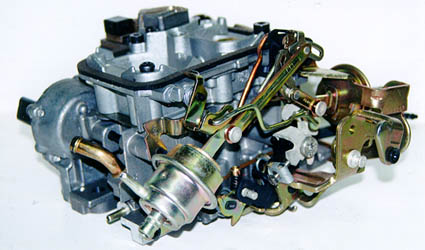For the holiday season we here at LWON are giving ourselves the gift of confronting our fears. We are choosing our own most daunting science-related subjects and writing about why they scare us.
My father wasn’t a physicist, but he could work wonders with gravity. He’d be showing me how to change a flat, or fix the boiler in the basement, or tune a carburetor, and I could feel the time-space suck gathering itself beneath my feet, buckling my knees and shrinking my shoulders, tugging me toward the center of the Earth.
The cause of this peculiar effect, I now realize, wasn’t my father but the subject. I have had the privilege of receiving guided tours of some of the coolest technology on the planet—telescopes on Mauna Kea, tabletop gravity experiments at the University of Washington, the Tevatron particle accelerator at Fermilab. I know they’re cool because my tour guides told me so. The passion of these guides—the scientists who know the instruments most intimately, who have nurtured them from spitballing sessions in the faculty lounge to $50 million, multi-ton, producing-results-in-peer-reviewed-journals reality—is very much parental. And if any scientists who have graciously given me tours happen to be reading this, thank you. Really. You’ve been great. You’ve given my tape recorder all the information I would eventually need in order to make sense of your babies. It’s not your fault that some of the time you were talking, I was thinking about the dinner of hot wings and beer I’d be having that evening at the dive bar down the street from my hotel.
I almost didn’t become a science writer, I’m so averse to technology. In the mid-‘90s, an editor at a New York publishing house called me with an idea for a book about the history of the telescope. She did this occasionally—called me with an idea for a book. Once she asked if I wanted to ghostwrite the autobiography of George Pataki, who had recently been elected governor of New York. I don’t know if I actually held the phone at arm’s length and gave it a WTF once-over. I don’t know if I did the same when she suggested a book about the history of the telescope, but I might have.
I didn’t like science. I’d always been bad at science. Biology, physics, chemistry—these were my worst subjects in school. I made sure that I got enough AP credits in math in high school that I could opt out of a lot of science requirements in college. Beakers bored me. The insides of a frog were as impenetrable as a carburetor. I couldn’t get microscopes to work. I could never see what I was supposed to be seeing, no matter how hard I tried to fix the focus or adjust the distance from my eye to the lens. The experience didn’t simply frustrate me; it left me weak. If I hadn’t been in biology lab, I would have had to lie down.
So—a history of the telescope? Even if my agent could negotiate a rider to the book contract stipulating that during the course of my research I would never have to look through one of the damned things, the offer to devote seven years and four hundred footnotes and a thousand pages to a piece of technology gave me as little pause as the offer to channel the deep thoughts of a Republican. And I said so to the editor.
“Think of it as an essay,” she said.
Essay? I’d written essays.
“A long essay,” she continued, “but a short book. Couple hundred pages.”
She allowed the pause to breathe.
“Take a month. Do some research. See what you think.”
I took a month, I did some research, and I concluded: An essay it is. If you want to know what Galileo’s observations meant in the moment of discovery, you have to know how civilization had previously viewed our place in the universe. Not just the Sun-revolves-around-the-Earth part, but who got to say how the heavens worked, and then what happened when anybody with access to a telescope could say how the heavens really worked: the transfer of power from the papacy to the individual; the Age of Reason; the rise of democracy. I could go on.
And I did. I said yes to the book offer because I realized that researching it would be like going back to college, only at an age that I could appreciate what I was reading, and without the student loans.
Yeah, I included some technology. A paragraph here on the advantages of the reflecting telescope over the refracting telescope (or was it the other way around?), a paragraph there on the relationship between tube length and something else that I’d have to look up because I can’t remember what it was or what the relationship between it and tube length meant. I understood that technical details were important to the astronomers who were creating the innovations, but mostly I understood that they were essential to the discoveries that repeatedly revolutionized our understanding of the history and philosophy of science, which is to say history and philosophy.
Take William Herschel, the late-eighteenth-century amateur astronomer who led the movement to use telescopes with mirrors. (Oh, right. The mirror in a reflecting telescope has a larger surface area than the lens of a refracting telescope, thereby allowing it to collect more light, therefore allowing the astronomer to see deeper into the night sky. But don’t hold me to any of this.) Herschel designed and built his own mirrors, the two largest of which had diameters of a foot-and-a-half and four feet, phenomenal for the time. During my research I read a lot about the grinding of those mirrors.
But here’s what I remember. The construction of the telescope demanded a team of workers. Herschel outfitted them with numbered jerseys, and he instructed them on what to do by calling out their numbers. If you’re looking for a metaphor for the dehumanizing influence of the Industrial Revolution, you could do worse.
And then there are the discoveries he made with his mirrors: Uranus, the first addition to the catalogue of planets since prehistory; moons of Saturn; moons of Uranus; numerous comets; and, because the technology allowed him to see so far across the universe, “planetary nebulae” that we today know are galaxies outside our own. If you’re looking for a metaphor for the ennobling influence of technological advances, you could hardly do better.
I know that other people can see objects under a microscope. I know that other people can look under the hood of a car and identify every last screw that’s there (assuming that cars have screws there). People fix boilers and change tires all the time, I hear. I know that if I put my mind to it, I could do any of those things. But I don’t put my mind to it, because I also know that my brain, for better or worse, is built for abstractions not objects, for the give-and-take of ideas not the nuts-and-bolts of focal points.
Oh, right. It’s not tube length. It’s focal length.
I have to go lie down.

